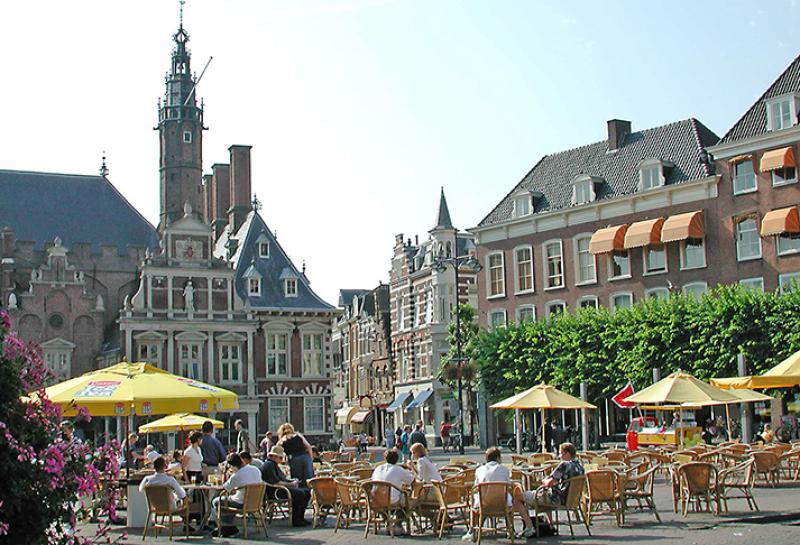Flabbergasted in a Haarlem B&B
This item appears on page 25 of the February 2022 issue.
I’m hanging out in the living room of my B&B in the Amsterdam suburb of Haarlem with my hosts Hans and Marjet.
Staying in a B&B saves money. As a bonus, I find that B&B hosts are often great students of intercultural human nature and love to share their findings. They give me an intimate glimpse of a culture I couldn’t get from the front desk of a hotel.
This is certainly true of Hans and Marjet, who encourage guests to make themselves thoroughly at home. And in their living room, with its well-worn chairs, crowded books, funky near-antiques and an upright piano littered with tattered music, it’s easy to feel at home.
•
I’m Hans’ pet Yankee. He’s on a personal crusade to get me to relax, to slow down. To Hans, I am the quintessential schedule-driven, goal-oriented American.
Hans provides more insight into the cultural differences of their guests.
“We Dutch are in the middle,” he says. “We are efficient like the Germans. That’s why there are many American companies here in Holland. But we want to live like the French.”
“And crack jokes like the English,” adds Marjet. “Everybody here admires the British sense of humor. We watch BBC for the comedies.”
Hans sees cultural differences in their guests’ breakfast manners, too. “Americans like hard advice and to be directed. Europeans — especially the Germans — they know what they want. The French take three days to defrost. But Americans talk and make friends quickly. Europeans, even with no language differences, keep their private formal island at the breakfast table.”
Pointing to their two kitchen tables, he continues: “If there are Germans sitting here and Americans there, I break the ice. Introducing the Americans to the Germans, I say, ‘It’s OK, they left their guns in the States.’ We Dutch are like the Germans… but with a sense of humor.”
“Thankfully, we get mostly Americans staying in our B&B,” says Hans.
“We’d be happy to fill our house with only Americans,” says Marjet. “Americans are easy to communicate with. They’re open. They taught me to express myself, to say what I really think.”
Hans breaks in with a Tony the Tiger tourist imitation, “Oh, wow, this is grrreat! What a grrreat house you have here!”
“Americans get flabbergasted,” Marjet adds.
“The English don’t know how to be flabbergasted,” says Hans.
Marjet says. “When we visited Colorado, my trip went better when I learned to say ‘wow’ a couple of times a day.”
Curling comfortably in the corner of the sofa, tucking her legs under her small body, Marjet explains, “When an American asks, ‘How are you?’ we say, ‘OK,’ to mean ‘good.’ The American says, ‘That doesn’t sound very good.’ We explain, ‘We’re European.’”
Hans says, “Then the American replies, ‘Oh, yes. You’re honest.’”
Fascinated by the smiley-face insincerity of America, Marjet says, “In the US, even supermarket shopping bags have big ‘Smile and be a winner’ signs.”
“It’s true,” I agree. “Only in America could you find a bank that fines tellers if they don’t tell every client to ‘Have a nice day.’”
Hans says, “Did you know that the Dutch are the most wanted workers at Disneyland Paris? This is because most Dutch are open-minded. We can smile all day. And we speak our languages.”
Marjet explains, “In Holland when someone asks, ‘Do you speak your languages?’ they mean ‘Do you speak French, German and English, along with Dutch?’”
Hans continues: “And, for us, acting friendly is maybe less exhausting than for the French. Can you imagine a French person having to smile all day long?”
Hans tops off my glass of Heineken. “God created all the world. It was marvelous. But France… it was just too perfect. So he put in the French to balance things out.”
“And Canada could have had it all: British culture, French cuisine, American know-how,” says Marjet. “But they messed up and got British food, French know-how and American culture.”
•
As I climb the steep Dutch stairs to my bedroom in the loft, I ponder the value of friends on the road. And I’m thankful that Europeans seem to enjoy being flabbergasted at how friendly we are.
Remember, with the right attitude, the most memorable moments of your day will often come long after the sightseeing is finished.
Rick Steves writes European travel guides and hosts travel shows on public TV and radio. Contact Rick Steves’ Europe (Edmonds, WA; 425/771-8303, www.ricksteves.com).

